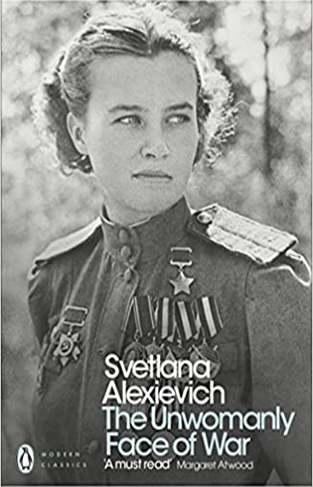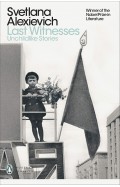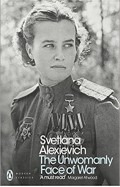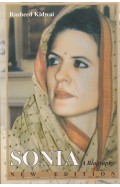The Unwomanly Face of War
By: Svetlana Alexievich
-
Rs 2,245.50
- Rs 2,495.00
- 10%
You save Rs 249.50.
Due to constant currency fluctuation, prices are subject to change with or without notice.
'It would be hard to find a book that feels more important or original' - Viv Groskop, Observer
Extraordinary stories from Soviet women who fought in the Second World War - from the winner of the Nobel Prize in Literature
"Why, having stood up for and held their own place in a once absolutely male world, have women not stood up for their history? Their words and feelings? A whole world is hidden from us. Their war remains unknown... I want to write the history of that war. A women's history."
In the late 1970s, Svetlana Alexievich set out to write her first book, The Unwomanly Face of War, when she realized that she grew up surrounded by women who had fought in the Second World War but whose stories were absent from official narratives. Travelling thousands of miles, she spent years interviewing hundreds of Soviet women - captains, tank drivers, snipers, pilots, nurses and doctors - who had experienced the war on the front lines, on the home front and in occupied territories. As it brings to light their most harrowing memories, this symphony of voices reveals a different side of war, a new range of feelings, smells and colours.
After completing the manuscript in 1983, Alexievich was not allowed to publish it because it went against the state-sanctioned history of the war. With the dawn of Perestroika, a heavily censored edition came out in 1985 and it became a huge bestseller in the Soviet Union - the first in five books that have established her as the conscience of the twentieth century.
'It would be hard to find a book that feels more important or original' - Viv Groskop, Observer
Extraordinary stories from Soviet women who fought in the Second World War - from the winner of the Nobel Prize in Literature
"Why, having stood up for and held their own place in a once absolutely male world, have women not stood up for their history? Their words and feelings? A whole world is hidden from us. Their war remains unknown... I want to write the history of that war. A women's history."
In the late 1970s, Svetlana Alexievich set out to write her first book, The Unwomanly Face of War, when she realized that she grew up surrounded by women who had fought in the Second World War but whose stories were absent from official narratives. Travelling thousands of miles, she spent years interviewing hundreds of Soviet women - captains, tank drivers, snipers, pilots, nurses and doctors - who had experienced the war on the front lines, on the home front and in occupied territories. As it brings to light their most harrowing memories, this symphony of voices reveals a different side of war, a new range of feelings, smells and colours.
After completing the manuscript in 1983, Alexievich was not allowed to publish it because it went against the state-sanctioned history of the war. With the dawn of Perestroika, a heavily censored edition came out in 1985 and it became a huge bestseller in the Soviet Union - the first in five books that have established her as the conscience of the twentieth century.
Chernobyl Prayer: Voices from Chernobyl: A Chronicle of the Future
By: Svetlana Alexievich
Rs 1,756.00 Rs 2,195.00 Ex Tax :Rs 1,756.00
Zubin Mehta: A Musical Journey (An Authorized Biography)
By: VOID - Bakhtiar K. Dadabhoy
Rs 630.00 Rs 1,050.00 Ex Tax :Rs 630.00
The Origins of Political Order From Prehuman Times to the French RevolutioN
By: Francis Fukuyama
Rs 3,505.50 Rs 3,895.00 Ex Tax :Rs 3,505.50
Manning Up: How the Rise of Women Has Turned Men into Boys
By: Kay Hymowitz
Rs 796.00 Rs 995.00 Ex Tax :Rs 796.00
The Obama Syndrome: Surrender At Home War Abroad
By: Tariq Ali
Rs 1,165.50 Rs 1,295.00 Ex Tax :Rs 1,165.50
The Quest For Meaning: Developing A Philosophy Of Pluralism
By: Tariq Ramadan
Rs 1,255.50 Rs 1,395.00 Ex Tax :Rs 1,255.50
The Pakistan US Conundrum Jihadists The Military And The People The Struggle For Control
By: Yunas Samad
Rs 1,255.50 Rs 1,395.00 Ex Tax :Rs 1,255.50
An Enemy We Created: The Myth Of The Taliban Al Qaeda Merger In Afghanistan 19702010
By: Alex Strick van Linschoten
Rs 4,200.00 Rs 5,250.00 Ex Tax :Rs 4,200.00
WikiLeaks: Inside Julian Assanges War on Secrecy
By: David Leigh & Luke Harding
Rs 680.00 Rs 850.00 Ex Tax :Rs 680.00
No recently viewed books available at the moment.
Zubin Mehta: A Musical Journey (An Authorized Biography)
By: VOID - Bakhtiar K. Dadabhoy
Rs 630.00 Rs 1,050.00 Ex Tax :Rs 630.00
Chernobyl Prayer: Voices from Chernobyl: A Chronicle of the Future
By: Svetlana Alexievich
Rs 1,756.00 Rs 2,195.00 Ex Tax :Rs 1,756.00
















-120x187.jpg?q6)





-120x187.jpg?q6)


-120x187.jpg?q6)



-120x187.jpg?q6)



